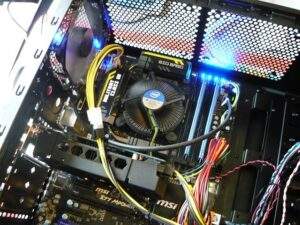Are you one of those people who get worried when their computer’s CPU usage goes up to 100%? You’re not alone!
High CPU usage can cause your system to slow down, freeze, or even crash. But is it dangerous if your CPU usage hits the maximum limit, even if it’s not overheating?
In this blog post, we’ll explore the world of CPUs and answer all your burning questions about high CPU usage. So sit back and relax as we dive into this topic that affects every PC user out there.
What is CPU Usage?
CPU usage refers to the amount of processing power being utilized by your computer’s central processing unit. In other words, it is a measure of how much work your CPU is doing at any given time.
When you open a program or run a process on your computer, the CPU works to execute those tasks. The more intensive the task, the higher the CPU usage will be.
Most operating systems have built-in tools that allow you to monitor your CPU usage in real-time. This can help you identify which programs or processes are causing high levels of CPU usage and potentially slowing down your system.
High levels of CPU usage aren’t necessarily dangerous on their own, as long as they don’t cause overheating or damage to other components in your system.
However, sustained high levels of CPU usage can lead to decreased performance and reduced lifespan for some components. Understanding what CPU usage is and how it affects your system can help you better manage and optimize its performance for better overall efficiency.
What causes CPU usage to increase?
There are several factors that can cause an increase in CPU usage. One common reason is running too many programs simultaneously, which can strain the processor and lead to high usage levels.
Another factor could be malware or viruses infecting your system. These malicious programs run in the background without your knowledge, consuming a significant amount of CPU power. Running regular scans using antivirus software can help identify and remove any potential threats.
Outdated or corrupt drivers can also contribute to increased CPU usage. When drivers are not updated regularly, they may become incompatible with the latest operating systems, leading to issues such as high CPU usage.
In some cases, faulty hardware components like a failing hard drive or defective RAM modules can also cause high CPU usage due to data transfer errors and delays. Regular maintenance checks on hardware components can help detect any potential issues before they escalate into major problems.
Understanding what causes high CPU usage is essential for keeping your system running smoothly and efficiently. By identifying these causes early on, you’ll be able to take steps toward resolving them before they affect your computer’s performance further down the line.
Is it dangerous if my CPU usage goes up to 100%?
When your computer’s CPU usage hits 100%, it can be a cause for concern. But is it dangerous? The answer depends on several factors, including how long the CPU has been at 100% and what tasks are causing the high usage.
In some cases, such as when running intensive software like video editing or gaming programs, it’s normal for the CPU to reach maximum capacity. However, if your CPU remains at 100% even while running basic programs like web browsing or word processing, there may be an underlying issue.
Sustained high CPU usage can lead to overheating and decreased performance over time. It may also indicate malware or other malicious software that is using your computer’s resources without your knowledge.
If you notice consistently high CPU usage, first try closing any unnecessary programs and restarting your computer. If this doesn’t help, consider scanning for viruses or seeking professional support.
While hitting 100% CPU usage isn’t necessarily dangerous in itself, sustained periods of high activity can have negative consequences for both performance and security.
How to Fix High CPU Usage
If you notice that your CPU usage is consistently high, there are several ways to fix the issue. The first step is to identify what program or process is causing the high usage. You can open Task Manager on Windows or Activity Monitor on Mac to see which programs are using the most CPU.
Once you have identified the culprit, try closing any unnecessary programs or processes running in the background. This will free up resources and lower your CPU usage.
Another solution is to update your drivers and software. Outdated software can cause compatibility issues with newer hardware, leading to high CPU usage. Make sure all of your drivers and software are up-to-date, especially for graphics cards and other hardware-intensive applications.
You may also want to consider upgrading your hardware if it’s outdated or not powerful enough for the tasks you’re performing. Adding more RAM or upgrading to a faster processor can significantly reduce CPU usage.
If all else fails, you may need to reinstall your operating system. This should only be done as a last resort but can solve any underlying issues causing high CPU usage.
Faqs
FAQs (Frequently Asked Questions) are a vital part of any article or blog post. In this section, we will address some common questions related to CPU usage and overheating.
Q: Can high CPU usage damage my computer?
A: High CPU usage won’t damage your computer per se, but it can cause issues such as slow performance and freezing. It’s essential to monitor your CPU usage regularly to avoid these problems.
Q: What should I do if my computer is overheating?
A: If you suspect that your computer is overheating, turn it off immediately and let it cool down for at least 30 minutes before turning it back on. You may want to check the fans and make sure they’re functioning correctly or clean out any dust buildup inside the case.
Q: How can I lower my CPU usage?
A: There are several ways you can lower your CPU usage, including closing unnecessary programs, disabling startup apps, updating drivers, and running virus scans. Additionally, upgrading your hardware components such as RAM or getting an SSD could also help improve performance.
In summary, keeping track of your system’s temperatures and taking steps to lower the load on your processor is crucial in ensuring its longevity.
Conclusion
Experiencing high CPU usage up to 100% is not necessarily dangerous for your computer as long as it doesn’t overheat.
However, it can cause performance issues and slow down your system. To prevent this from happening, you should monitor your CPU usage regularly and look out for any abnormal spikes.
If you do notice that your CPU usage is consistently reaching 100%, there are several ways to fix the issue, such as closing unnecessary programs or updating drivers. You may also want to consider upgrading your hardware if necessary.
Remember that prevention is always better than cure when it comes to high CPU usage. By practicing good computer hygiene habits like regular maintenance and avoiding running too many programs at once, you can minimize the risk of encountering this problem in the first place.
Understanding what causes high CPU usage and how to fix it can help you keep your computer running smoothly without risking damage or harm. So stay vigilant and take care of those CPUs!

